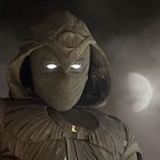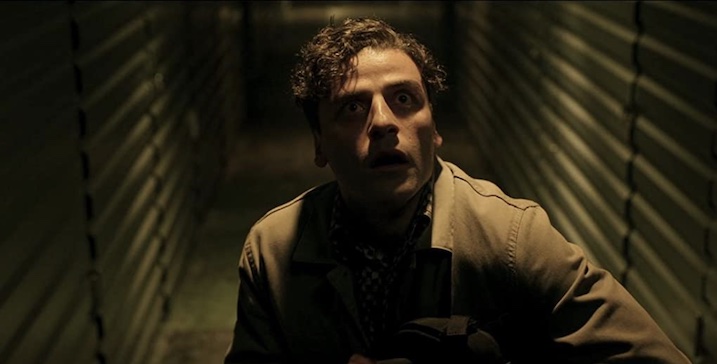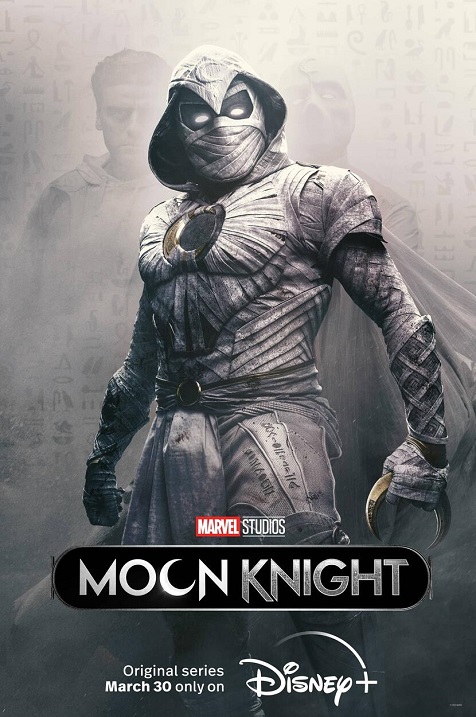Marvel’s ‘Moon Knight’ Offers Promise & Problems (TV Review)
 Based on the Marvel comic of the same name, Moon Knight is a six-episode season, opening up a new side of the MCU. Critics were given access to the first four episodes before the first episode premieres on March 30 on Disney+. Going in, I knew zero about the split-personality superhero. However, I was intrigued by the London to Egyptian settings and the strong dual leads (Oscar Isaac and Ethan Hawke). I’ve (mostly) enjoyed all the MCU television outings, both on D+ and Netflix, and was ready to look myself in the mirror and say, “let’s go, cool grey-outfitted hero dude!” Having seen two-thirds of the season, did it reach the highs of Loki or the unevenness of Falcon and the Winter Soldier? Time to find out!
Based on the Marvel comic of the same name, Moon Knight is a six-episode season, opening up a new side of the MCU. Critics were given access to the first four episodes before the first episode premieres on March 30 on Disney+. Going in, I knew zero about the split-personality superhero. However, I was intrigued by the London to Egyptian settings and the strong dual leads (Oscar Isaac and Ethan Hawke). I’ve (mostly) enjoyed all the MCU television outings, both on D+ and Netflix, and was ready to look myself in the mirror and say, “let’s go, cool grey-outfitted hero dude!” Having seen two-thirds of the season, did it reach the highs of Loki or the unevenness of Falcon and the Winter Soldier? Time to find out!

While the previous Marvel entries on Disney+ have starred characters from MCU’s big screen (Wanda, Hawkeye, Loki, Sam & Bucky), Moon Knight is the first time viewers will get to know the Egyptian moon-powered character. On the Netflix/MCU scale, the outcome is more akin to Jessica Jones’ anti-hero than Luke Cage’s all-around good guy.
Quirky but harmless gift store clerk Londoner Steven Grant (Isaac) has tried to handle his sleepwalking by tying himself to a bed in case he were to arise while in dreamland. Other precautions, like taping the front door of his flat or putting sand near the bed to reveal if he got up, are employed nightly. Still, no matter the amount of preparations, Steven often wakes up on the street or in other places that are not his bed. It’s a pain, but he’s learning to cope.
All that changes when amid people trying to kill him, he’s forced to see another self in a mirror. This man is Marc Spector, who’s made a deal with the moon god Khonshu (voiced by F. Murray Abraham) to protect another god’s secret location while killing those who seek her out. Does it matter if those people are good or bad? It does not.
Still, any shades of grey (like his suit!) are gone when we meet the series’ villain Arthur Harrow (Hawke). A cult leader with nifty powers of his own, Harrow has one goal: to find the location of the hidden goddess and set her free. Grant/Spector are in possession of a golden scarab which looks like a slightly larger quidditch snitch and can lead anyone to her location. Along the way, the naive but moral-leaning Steven will meet Layla (May Calamawy) whom his other self Marc was involved with romantically.
This might seem like a lot of plot, but Moon Knight is essentially a chase story for the first three episodes. The hook is that Steven can’t decide when he should let Marc out to do the superhero stuff. The problem, narratively, is viewers will most likely get on board with the fights and whatnot long before Steven does.

The length of WandaVision episodes originally started at a tight thirty minutes (minus end credits) before the plot necessitated longer runtimes. Such restrictions should have been employed here. Too often, the bulk of the 50+ minute episodes stand in place with Steven looking at Marc in a mirror (btw, there are more mirrors/puddles/reflections than any other show) debating whether to let him out. To be fair, Marc is the jerk of the pair, but when CGI monsters or baddies with automatic weapons are in pursuit, one would think you’d let the one with the super moves out sooner. This happens a lot throughout the first three episodes. Despite Isaac’s charms, the bit gets old.
Beyond Isaac giving his all, Hawke is terrific and arguably the show’s best feature. He’s been villainous before, but the Before Trilogy actor balances his likeability with menace to great results. Like the tech con artists of recent shows such as Apple’s WeCrashed or Hulu’s The Dropout, we want to go along for the ride despite knowing these are terrible people devoid of empathy for others. Unlike those Silicon wannabes, Arthur’s plan (which I won’t spoil) isn’t 100% nefarious. Moon Knight is strongest when simply letting Isaac and Hawke duke it out verbally instead of amongst mindless action.
The production value is not Loki-level inspired, but the various locations, particularly a later episode in a pyramid, are well-staged. The battles between heroes and foes aren’t amazing (or, for that matter, incredible or uncanny), but they get the job done. And yet, the fourth episode introduces new ideas and conflicts that sucked me in. Will Moon Knight work well enough week-to-week? One hopes that’s the case, as episode four is worth it. Power through, true believers!
![]()
![]()
![]()




















